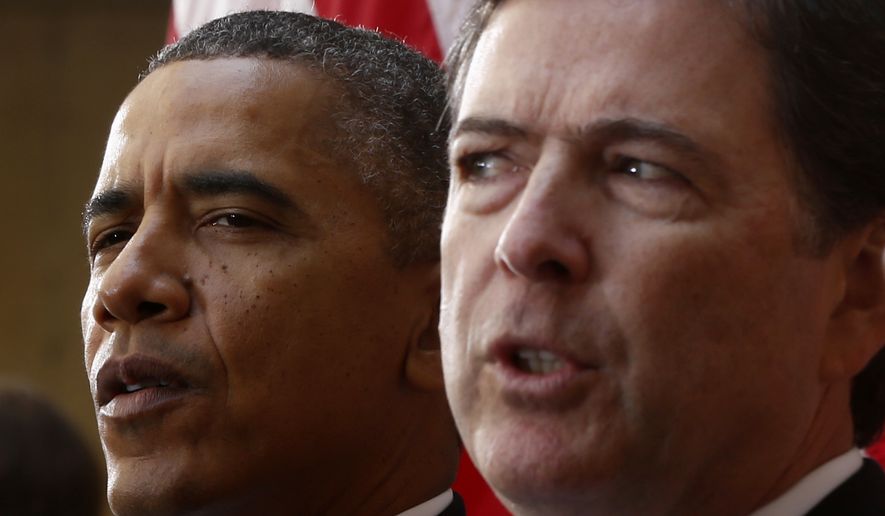As FBI agents race to sort through the latest trove of emails related to the probe of Hillary Clinton’s private email server ahead of Election Day, another investigation involving the bureau’s director is brewing.
After Director James B. Comey on Friday disclosed the FBI’s renewed investigation to Congress, a former White House ethics lawyer said he has filed a complaint about the director’s actions with the U.S. office of special counsel and asked officials to look into whether Mr. Comey violated a federal law that prevents government employees from engaging in partisan political activity.
Richard Painter, who served as chief ethics lawyer in the Bush administration from 2005 to 2007 and is supporting Mrs. Clinton, wrote in an op-ed published in The New York Times that he believes Mr. Comey violated a provision of the Hatch Act that bans federal employees from using their official positions to influence elections.
A spokesman for the U.S. office of special counsel said the office does not confirm or deny whether matters are under investigation.
But if the office opens an investigation and finds Mr. Comey violated the law, his fate would rest with either President Obama or whomever is elected Nov. 8 to succeed him. The scenario leaves open the odd possibility that Mrs. Clinton could be left to decide whether Mr. Comey’s actions deserve punishment, and if so to determine how severe the penalty.
Mr. Comey on Friday wrote to members of Congress to inform them that the FBI would reopen the Clinton server probe after newly discovered emails “appear pertinent to the investigation.” In addition to Mr. Painter, Senate Minority Leader Harry Reid, Nevada Democrat, also raised concern that Mr. Comey’s actions violated the Hatch Act.
SEE ALSO: White House calls FBI Director Comey ‘a man of integrity’
Kathleen Clark, an analyst on government ethics and a law professor at Washington University, said the accusations seem worth investigating.
“I thought his letter was an overshare. Looking at it on its face, it wasn’t obvious to me that this could be a Hatch Act violation,” Ms. Clark said. But then she read the memo Mr. Comey sent to FBI employees, in which he wrote that he felt an obligation to act so as not to mislead the public.
“That statement is written 11 days before a national election and he’s expressing concern because he thought he would be misleading the American people. That suggests to me that he wanted to influence the American people,” Ms. Clark said. “He did not have any legal or ethical obligation to write that letter.”
The Hatch Act was adopted in 1939 to keep federal employees from directly supporting candidates. Recent cases investigated by the office of special counsel include federal employees who have solicited donations for political campaigns while on the job or displayed signs — in one case a bobblehead doll of Hillary Clinton — showing support of candidates in the workplace.
While not a criminal statute, Hatch Act violations can result in penalties ranging from a reprimand to a fine of up to $1,000 to termination.
A U.S. Postal Service letter carrier who was found to have violated the act this year by displaying a congressional candidate’s campaign sign in a delivery truck while he delivered mail ultimately was suspended without pay for five days, according to an office of special counsel report from July.
In cases in which a Hatch Act violator is an appointee of the president, the office of special counsel sends a report on its findings to the president, who will make the determination on any penalties.
The most recent case in which a presidential appointee was investigated involved Housing and Urban Development Secretary Julian Castro. The office of special counsel concluded that Mr. Castro violated the federal law when he praised Mrs. Clinton in a news interview in April at his office. Following a three-month investigation, the White House announced that President Obama would not discipline Mr. Castro.
The White House on Monday declined to be drawn into speculation over whether the FBI director, appointed by Mr. Obama in 2013, may have violated the Hatch Act.
“I’ll neither defend nor criticize what Director Comey has decided to communicate to the public about this investigation,” said White House press secretary Josh Earnest. “The president doesn’t believe he’s secretly strategizing to benefit one candidate or political party. He’s in a tough spot.”
The FBI has declined to comment further on the review of the additional emails, which were recovered as part of a separate investigation of accusations that former Rep. Anthony D. Weiner sent illicit messages through text and social media applications to a 15-year-old North Carolina girl.
Mr. Weiner is the estranged husband of Huma Abedin, a top personal aide to Mrs. Clinton, and officials have received a warrant authorizing collection of emails related to the Clinton investigation that were found on a device in his possession.
The FBI has given no timetable for how long the review of the emails might take as investigators work to determine whether any classified information was part of the latest batch of correspondence that was uncovered.
In a letter sent Monday to senators who requested additional information about the FBI probe, Assistant Attorney General for Legislative Affairs Peter Kadzik wrote that the Justice Department is working closely with the FBI and dedicating the appropriate resources to “take appropriate steps as expeditiously as possible.”
• Andrea Noble can be reached at anoble@washingtontimes.com.




Please read our comment policy before commenting.